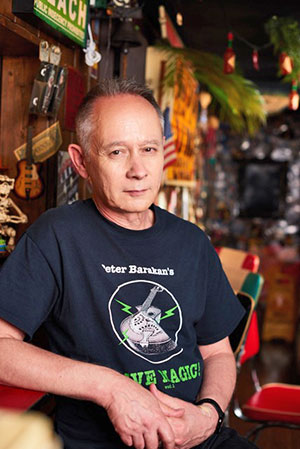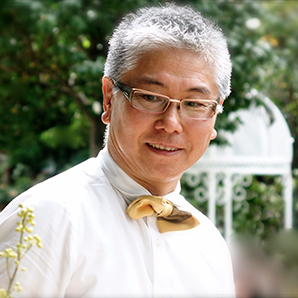
Peter Barakan has lived in Tokyo since 1974
From his first job working at a record store in Earl’s Court to a stalwart of Tokyo’s radio and television scene, Peter Barakan has spent his entire adult life surrounded by music.
And music has provided “the best job in the world”, Barakan told BCCJ ACUMEN.
“I have been really lucky from start to finish”, the 65-year-old Londoner said. “I had a full-time day job until 1986, when I went freelance, so I had a paycheck every month and there was no pressure on me to be commercial with my music choices.
“I suppose you could say that I got into radio so I could impose my musical tastes on other people”, Barakan says with his easy smile. “There are a number of people who find what I do interesting, and that has led to me constantly being able to work.
“And that is something of a surprise, because the music industry is in dire straits and people are expected to toe the corporate line and that is something that I have never done”, he added.
Born in central London, Barakan’s family moved around the north of the city throughout his childhood before he decided, for reasons that he still finds hard to fathom, to study Japanese at the University of London’s School of Oriental and African Studies.
“It seemed like a reasonably interesting thing to do, but I never chose to study Japanese because I had the intention of coming here”, he said.
A natural affinity for languages, plus a background in Latin and Greek, with some French and Russian thrown in, enabled Barakan to master Japanese, a tongue that he describes as logical and “not as difficult as it first looks”.
Barakan admits that after graduation, when working at a record shop, where the pay was poor and the hours were long, he had twinges of concern about his future. Then, in 1974, fate intervened and he was offered a job with a music publishing company in Tokyo.
“I arrived without any sort of plan. I’m quite bad at making plans and tend to do things on the spur of the moment, but I did not expect to be here for the long term”, he said.
The fact that Barakan was, in his own words, “a total music freak”, served him well in his new job. But it involved a great deal of paperwork, as he negotiated with music publishers in other parts of the world in those days before email.
Six years later, he was given the opportunity to host his first radio show and he has not looked back since.
“I think I’m pretty good at picking music and, if you are able to talk about music, then I find being a DJ enjoyable and easy. But I’m not so good if I have to read from a script”, he said. “I much prefer ad-libbing”.
Barakan first hosted a radio show on FM Tokyo before taking on additional slots at NHK and a music video broadcast for TBS. For 25 years, he has also been hosting the Japanese edition of 60 Minutes, the US current affairs programme.
Barakan says his musical tastes are rooted in the sounds of the 1960s, but stretch across rock, soul, blues, folk, jazz, gospel and even―“as I get older” country.
“Basically I like any genre, but I am pretty picky about what I do and don’t like within each genre”, he said. “And I never liked heavy metal or commercial pop, and was never a big fan of hip-hop”.
Pressed to name a favourite musician to listen to, he identifies Little Feat and Donny Hathaway.
Barakan also considers himself fortunate to have been given the opportunity to interview some of the biggest names of the music world, such as Georgie Fame and the late Jaco Pastorius, the legendary bassist who played with Weather Report in the 1970s.
When it comes to Japanese musicians, Barakan plumps for slightly more obscure bands, such as the Ainu musician Oki, and the young funk band Black Wax, from Miyakojima in Okinawa.
“They do original material mixed in with a variety of covers of Western stuff, running the gamut from ’50s R&B to bossa nova to Sonny Rollins to Herbie Hancock’s ‘Chameleon’”, he said.
“They are a little rough still at times, but they have a pretty original groove and I think they could do really well in clubs, and maybe festivals, around the world if someone with a little entrepreneurial flair took notice”.






